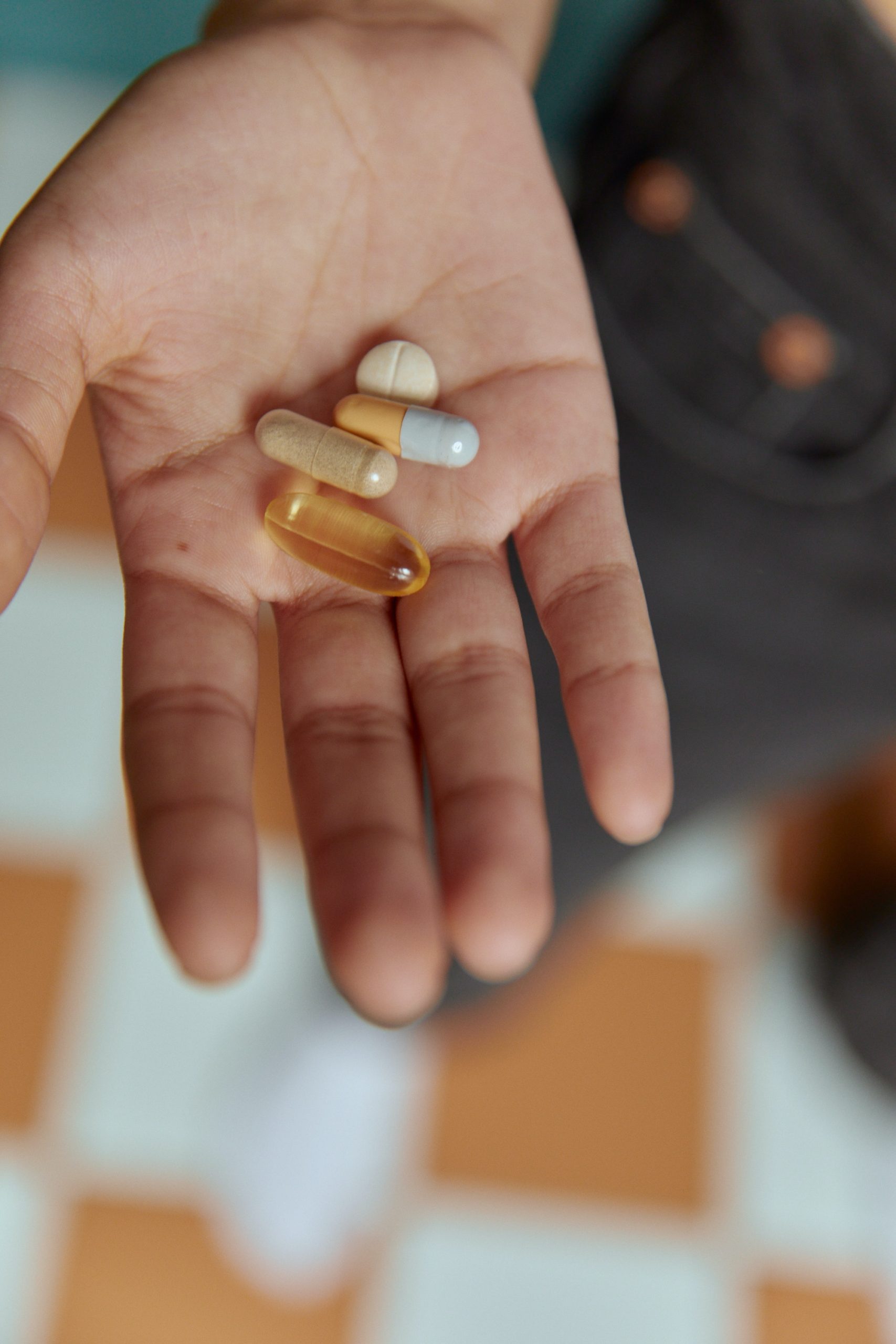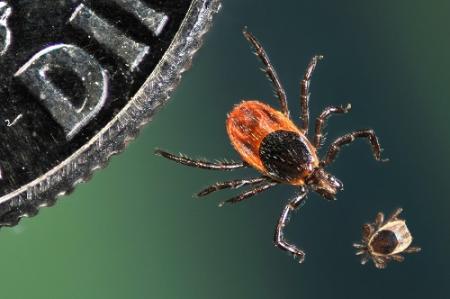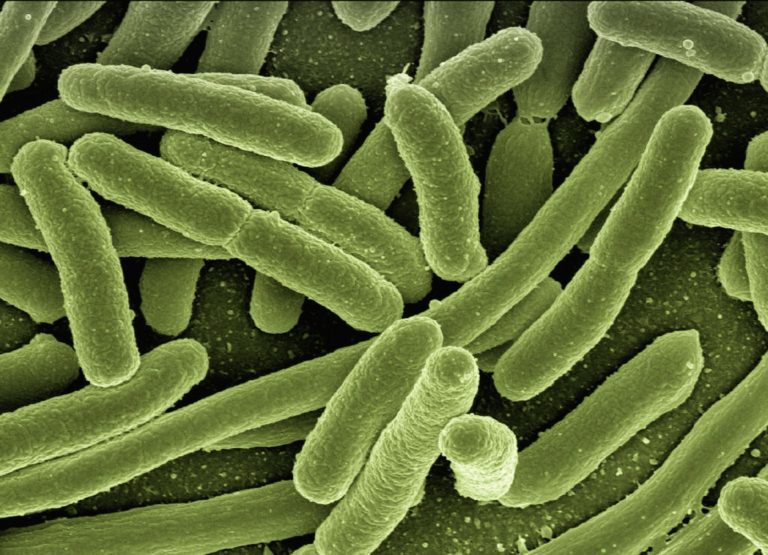Best supplements for better health
(This post may contain affiliate links. See the full affiliate disclosure here for more info.)
I’ve been wanting to write a post on the best supplements for better health for a very long time.
I knew it would be long, but I wanted to do my homework and give you relevant scientific information. Here it is. I hope that there’s a section or two that you can put to use to improve your health.
Not all conditions have to be treated with prescription medication. The medical field has embraced the power and usefulness of many supplements, and their efficacy has been demonstrated by clinical evidence (not to mention centuries of use as traditional Chinese medicine).
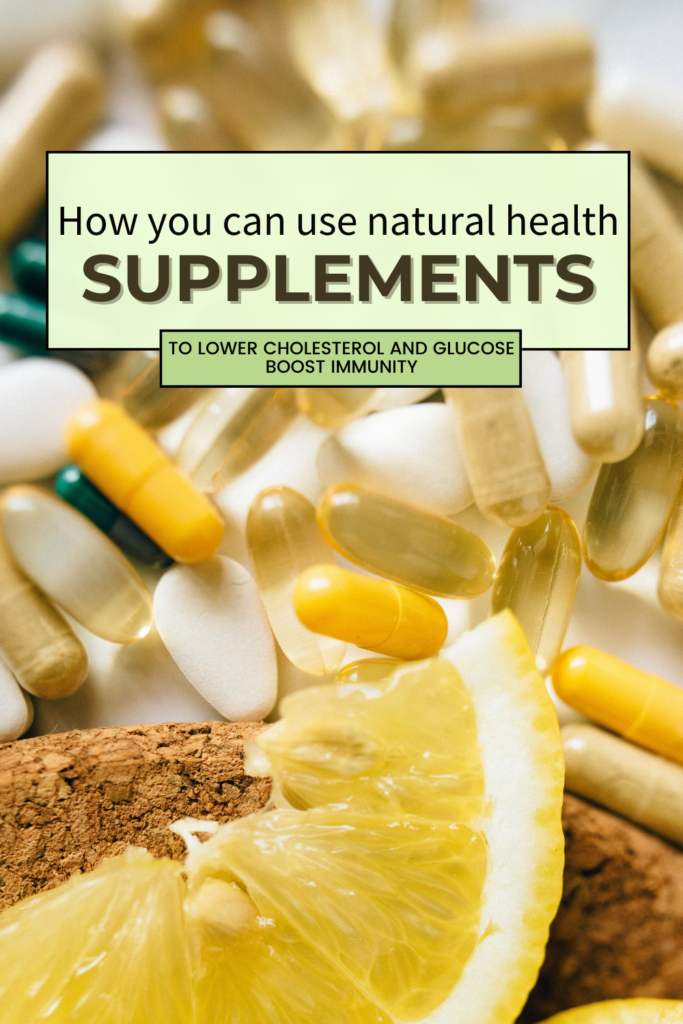
Taking zinc can shorten a cold, and fish oil containing omega-3 fatty acids can help lower the risk of a heart attack. Nevertheless, misinformation abounds, and I can help sift facts from fiction by researching the scientific findings on different supplements.
Here, I present information on supplements that can help to address some of the most serious health issues we face—high cholesterol, high blood sugar, low immunity, and systemic inflammation, including metabolic syndrome.
I’ll give you ways to achieve better health naturally through superfoods and exercise, then tell you the best supplements to help prevent conditions like high cholesterol and high blood sugar.
Because it’s super-important, I’m putting this warning at the beginning and end of the blog post: ALWAYS talk to your doctor before adding dietary supplements because some may interact with other medications you are taking and cause adverse effects.
The FDA does not regulate supplements
One thing that is important to understand, however, is that supplements are not regulated by the Food and Drug Administration (FDA). That means that the quality, purity, and even the content is not assured. The batch-to-batch variation may not be tested, and the ingredients and concentration of the ingredients may differ from what is advertised.
Other ways to verify the quality of supplements and find the best supplements
That said, your best bet as a consumer is to try to buy supplements verified by the US Pharmacopeia or those registered with the FDA.
US Pharmacopeia-verified
According to the USP, USP verification indicates that the product:
- Contains the ingredients listed on the label, in the declared potency and amounts. Tests have shown that the contents of some supplements don’t match the label, and some contain significantly less or more than the claimed amount of key ingredients. USP Dietary Supplement Verification (DSV) helps assure customers that they are getting the value they expect from a product they are purchasing.
- Does not contain harmful levels of specified contaminants. Some supplements have been shown to contain harmful levels of certain heavy metals (e.g., lead and mercury), microbes, pesticides, or other contaminants. At specific levels, these contaminants can pose serious risks to one’s health.
- Will break down and release into the body within a specified amount of time. If a supplement does not break down properly to allow its ingredients to be available for absorption in the body, the consumer will not get the full benefit of its contents. USP DSV tests products against performance standards.
- Has been made according to FDA’s current Good Manufacturing Practices (GMP) using sanitary and well-controlled procedures. The assurance of safe, sanitary, well-controlled, and well-documented manufacturing and monitoring processes indicates that a supplement manufacturer is quality-conscious and that the supplement will be manufactured with consistent quality from batch to batch.
Other supplement verifications
I’m sure you’ll agree that those are very important features to verify. However, sometimes, it’s not possible to find USP-verified supplements.
In those cases, look for products that meet NSF or ConsumerLab.com standards. In 2021, Amazon required products sold on the site to meet certain NSF standards.
Look for vitamins made in the United States using quality control measures listed on the manufacturer’s website. A site with tight quality control will say that its vitamins are made using Good Manufacturing Practices (GMP), standards set by the FDA.
 Supplements for better health
Supplements for better health
Lower cholesterol
Many people aren’t aware that cholesterol is necessary for human health. It is a vital component of steroid hormones, cell membranes, and vitamin D.
Our livers make cholesterol for those purposes, but blood cholesterol levels reflect cholesterol consumed in the foods we eat and that made by the liver.
Cholesterol travels in the body on fat-containing proteins (lipoproteins), which exist as either high or low-density lipoproteins.
Low-density lipoprotein (LDL) cholesterol is the most abundant but is also considered “bad” cholesterol. High-density lipoprotein (HDL) cholesterol absorbs cholesterol and brings it back to the liver. It is considered “good” cholesterol.
Cholesterol levels are measured through a simple blood test. Total cholesterol levels should be less than 200 mg/dl, HDL levels should be less than 40 or 50 mg/dl for men and women, respectively, over the age of 20, and LDL levels (bad cholesterol) should be less than 100 mg/dl. High cholesterol levels are often controlled by taking statin medications to reduce the risk of heart disease.
Besides diet, high cholesterols can be inherited (familial hypercholesterolemia). High LDL cholesterol levels are associated with an increased risk of cardiovascular disease.
According to the Centers for Disease Control and Prevention:
- In 2015–2018, nearly 12% of adults age 20 and older had total cholesterol levels over 240 mg/dL, and about 17% had HDL levels of less than 40 mg/dL.
- Only a little more than half of the U.S. adults (54.5%, or 47 million) who could benefit from cholesterol medicine like a statin drug are currently taking it.
- Nearly 94 million U.S. adults age 20 or older have total cholesterol levels higher than 200 mg/dL.
- Adults aren’t the only ones who can have high cholesterol levels; 7% of U.S. children and adolescents ages 6 to 19 have high total cholesterol levels.
Diet and exercise to lower cholesterol
If you’re trying to lower your cholesterol by changing your diet, try to decrease or eliminate your intake of red meat, dairy products, and eggs, as they can raise cholesterol levels.
Studies have shown that a healthy lifestyle that includes exercise and dietary changes can help to improve cardiovascular health.
Plant-based diets
Plant-based diets have been shown to decrease cholesterol levels. A meta-analysis (an analysis of all relevant published studies) in 2017 reported that vegetarian diets were associated with lower average total cholesterol levels (by 12.5 to 29.2 mg/dL), LDL cholesterol (by 12.2 to 22.9 mg/dL), and HDL cholesterol (by 3.4 to 3.6 mg/dL) compared to those who ate a varied diet.
Believe it or not, Pinterest can be a great source of plant-based recipes made with simple and pure ingredients.
Significant decreases in total cholesterol and LDL cholesterol were reported in subjects who took 20 g of garlic daily plus 1 tablespoon of lemon juice. But that’s a little more than one whole bulb of garlic! Other studies reported that half to one clove of garlic a day lowered cholesterol levels by approximately 10%.
I love garlic, but I’m not sure I can fit one whole clove into my diet every day. Thankfully, you can buy garlic supplements (see below).
Increase dietary fiber to lower cholesterol
Studies have shown that 25-35 grams of fiber a day can lower cholesterol. Good sources of soluble fiber are whole grains like oats, nuts, legumesm like beans and lentils, and vegetables and fruit.
Flax can also lower cholesterol. It contains the omega-3 fatty acid alpha-linolenic acid, which has been shown to significantly reduce the risk of sudden death due to irregular heartbeats and all causes of death in patients with heart disease.
It has a wonderful nutty taste that goes great in hot cereal, yogurt, and salads. Be sure to grind it as that’s where the important compounds are. Ground flaxseed should be stored refrigerated.
But flax oil capsules are also available.
Fiber supplements I like contain psyllium because psyllium was scientifically shown to lower LDL cholesterol.
Beets are high in fiber and have many beneficial health effects. They lower cholesterol, help lower blood pressure, protect cells from damage (they are anti-oxidants), and decrease inflammation in the body.
I plan to write a post entirely dedicated to beets! In the meantime, here are 20 anti-inflammatory recipes from Allrecipes.
Exercise to lower cholesterol
Exercise has positive effects on decreasing cholesterol levels. The American Heart Association recommends at least 150 minutes per week of moderate-intensity aerobic activity, 75 minutes per week of vigorous aerobic activity, or a combination of both, preferably spread throughout the week.
They also suggest adding moderate to high-intensity muscle-strengthening activities (such as resistance or weights) at least twice a week.
Simple diet and exercise changes can have positive effects on your cholesterol levels.
Supplements to lower cholesterol
Fish oil containing omega-3 fatty acids is used to treat high cholesterol and high blood pressure
“The American Heart Association recommends consumption of two servings of fish per week for persons with no history of coronary heart disease and at least one serving of fish daily for those with known coronary heart disease. Approximately 1 g/day of eicosapentaenoic acid plus docosahexaenoic acid (both are types of omega-3) is recommended for cardioprotection. Higher dosages of omega-3 fatty acids are required to reduce elevated triglyceride levels (2-4 g/day). Modest decreases in blood pressure occur with significantly higher dosages of omega-3 fatty acids” (Jain AP, Aggarwal KK, Zhang PY. Omega-3 fatty acids and cardiovascular disease. Eur Rev Med Pharmacol Sci. 2015;19(3):441-5. PMID: 25720716).
Here’s an omega-3 fish oil that comes in 1000 g taken three times daily.
Niacin
Niacin can lower bad cholesterol by blocking its production in the liver. However, at the doses needed, many people experience side effects like flushing and itching.
Flush-free niacin is available over-the-counter, but it’s best to let your doctor decide whether that, a niacin prescription, or neither is best for you.
Garlic

A research study treating patients with 600–1200 mg of garlic found that both systolic (top number) and diastolic blood pressure (bottom number) improved in 24 weeks to values comparable to those in patients who took atenolol.
Here’s a good source of odorless garlic.
Beets

Beets have finally become popular. What’s not to love? They are sweet and delicious. You can boil them, roast them, or make them into spiced pickles or chips.
But now, the world has also discovered how good for you they are.
Beets are high in fiber, helping to control weight, cholesterol, and sugar; nitrates that help with blood pressure; and vitamins. They also have antioxidant and anti-inflammatory properties, which help with metabolic syndrome (see below).
Even if you love beets, instead of a heaping plate every day, now beet powder supplements are available.
Lower blood sugar
Like cholesterol, our body needs sugar. It helps to supply the energy needed by every cell in the body. However, it doesn’t and shouldn’t be consumed as added sugar because the carbohydrates in fruits and vegetables provide plenty.
Too much sugar can overwhelm the sugar (glucose)-insulin system. Insulin is produced in the pancreas and helps glucose enter cells. Excess glucose can be stored in the liver as glycogen for later use or circulate, increasing blood sugar levels.
Patients with type 1 diabetes mellitus make insufficient amounts of insulin because of a genetic disorder that causes the immune system to attack the immune-producing cells in the pancreas.
Type 2 is an acquired form of diabetes, is diet-related, and develops over time. Consistently consuming large quantities of sugar can cause the pancreas to release more and more insulin, increasing the probability of developing insulin resistance and resulting in high blood glucose levels. In that case, blood sugar levels remain high, and excess sugar is stored as fat.
According to the American Diabetes Association, type 2 diabetes symptoms include:
- Urinating often
- Feeling very thirsty
- Extreme fatigue
- Blurry vision
- Cuts and bruises that are slow to heal
- Tingling, pain, or numbness in the hands/feet
Because the risk factors for type 2 diabetes are lifestyle-related, modifications can go a long way to prevent, mitigate, and even cure it.
Thus, it goes without saying that everything we eat should be scrutinized for the added sugar it might contain. Eating fresh fruit and berries is best for feeding a sweet tooth.
A combination of exercise, eating a healthy diet, and nutritional supplements are the best way to lower blood sugar levels and achieve sugar balance. You may be able to avoid taking a diabetes drug, and type 2 diabetic patients may be able to decrease the medications they take and see significant improvements in their high blood sugar levels.
Exercise

Getting regular exercise is a good way to get and maintain healthy blood sugar levels. Exercise has been shown to increase the uptake of glucose from the blood by skeletal muscles.
Just one week of aerobic exercise—where breathing and oxygen intake are increased—was shown to improve whole-body insulin sensitivity in individuals with type 2 diabetes. Moderate and vigorous aerobic training improved insulin sensitivity.
Supplements to lower blood sugar and achieve blood sugar control
The best blood sugar support supplements have been shown in numerous studies and clinical trials to help keep blood sugar in the normal range, curb insulin production, and reverse type 2 diabetes.
Because blood sugar levels vary greatly in response to the type of food eaten, your doctor may also measure your hemoglobin A1c
level.
Hemoglobin A1c is glycosylated hemoglobin, a sugar carried by hemoglobin. It is a better measure of your average blood
sugar.
Bitter melon
Since bitter melon may lower glucose levels, do not take it if you are taking metformin or other glucose-lowering drugs.
Bitter melon has been eaten for centuries to control diabetes symptoms. Science has started to study where the effects come from and has conducted numerous studies of bitter melon extract. They found it to contain 225 medicinal constituents.
Fifteen clinical studies using bitter melon fruit, powder, and extract found clinical efficacy in reducing blood glucose levels in 12 studies. Still, some of the studies have been criticized for having poor designs and inadequate numbers of study subjects.
The recommended daily dose of bitter melon extract is not known. The recommended dose of this bitter melon is two capsules three times a day.
Cinnamon supplements
Not all cinnamon is equal. Research on diabetic rats showed that Ceylon cinnamon can lower blood sugar levels, so it’s important to look for supplements containing that form of cinnamon, not forms from Indonesia.

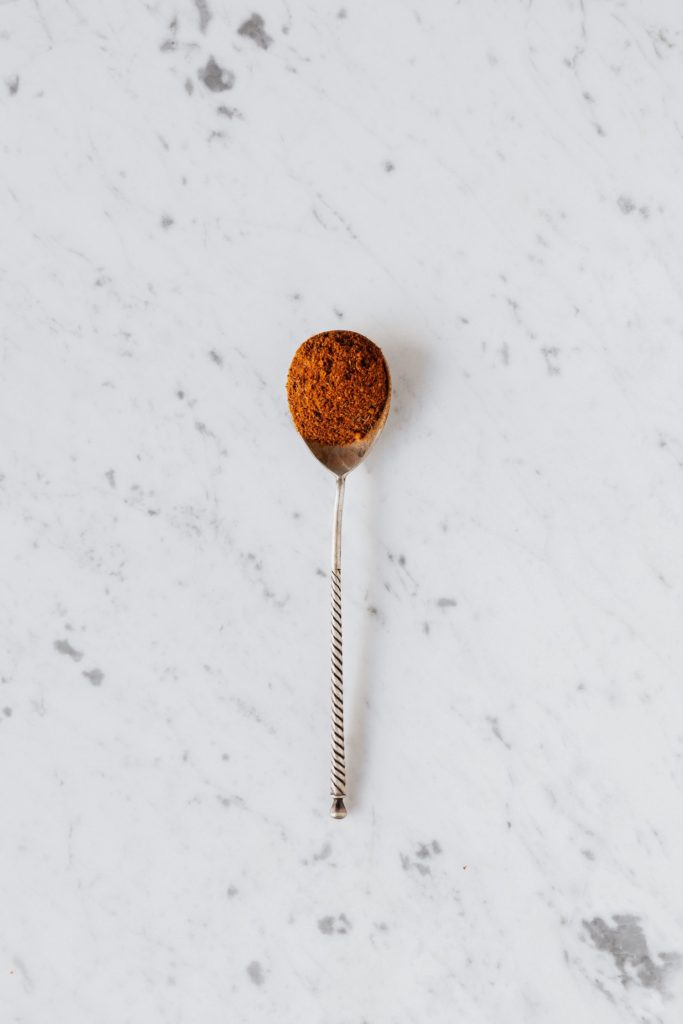
There is no recommended human dose of cinnamon extract, but it is available in many dosages, such as 1800 mg Ceylon cinnamon capsules.
Berberine
First of all, do not take berberine if you are taking metformin or other glucose-lowering drugs because berberine has powerful effects to lower glucose.
A dose of 500 mg of berberine twice a day with meals is recommended.
Side note: A systematic review of relevant scientific studies (called a meta-analysis) over 10 years found that alpha-lipoic acid helped to decrease diabetic neuropathy and nerve damage caused by long-term diabetes.
Reduce inflammation and metabolic syndrome
Metabolic syndrome is a set of conditions that include high blood pressure, high blood sugar, fat around the waist, and high cholesterol or triglyceride levels. People with metabolic syndrome are at increased risk of heart disease and diabetes. It is considered to be a disorder of generalized, systemic inflammation throughout the body. Thus, targeting inflammation can be one way to prevent or mitigate the effects of metabolic syndrome.
In addition to the supplement listed here. it is important to see the measures listed above to reduce high cholesterol and blood glucose levels. Diet, exercise, and reducing stress can have positive effects on metabolic syndrome.
Supplements to reduce inflammation and metabolic syndrome
Stress increases cortisol, the fight-or-flight hormone made and released by the adrenals. Chronic stress increases the risk of developing chronic conditions like obesity, diabetes, hypertension, heart disease, stroke, cancer, osteoporosis, and fibromyalgia and weakens the immune system.
Being in chronically stressful situations can impair immune health.
Ashwagandha
Ashwagandha is an herb used in traditional Indian medicine, called Ayurvedic medicine) for millennia to treat a variety of illnesses and promote general health. It has been shown to help to decrease the symptoms of stress.
The recommended dosage is 500 mg twice a day. You can find Ashwagandha here.
Ashwagandha can affect thyroid function, so patients taking thyroid medication or altered thyroid function should not take it. It is also not recommended for breastfeeding and pregnant women.
Turmeric
Scientific evidence has shown that turmeric (curcumin) has anti-inflammatory properties. This spice also has anti-oxidant effects against free radicals that damage cells.
When the major component of black pepper (piperine) was given with curcumin, the effect of curcumin went up by 2000%. Therefore, it’s important to look for a supplement with turmeric (curcumin) and black pepper to get the full benefits.
Boost immunity
Now, more than ever, we are looking for ways to get healthy and stay healthy. We want our immune system to be in the best shape it can be to fit the next pandemic agent.
How can immunity be boosted naturally? The best defense is a strong immune system and overall good health, which includes a good diet, getting enough sleep, and maintaining a healthy weight. When we encounter foreign invaders like infectious agents, we want our body’s immune system to mount an immune response that includes activating white blood cells and producing antibodies.
Pertaining to dietary supplements and COVID-19, the National Institutes of Health stated, “People require several vitamins and minerals—including vitamin C, vitamin D, and zinc—for proper immune function, and clinical deficiencies of these nutrients can increase susceptibility to infections.” Citrus fruits are good sources of vitamin C, but vitamin C supplements are available in much higher dosages than you can get from your diet.
One way to boost immunity is to be sure that you have adequate levels of vitamin D. Recent research reported that people with vitamin D deficiency were shown to have higher rates of COVID-19 and a greater likelihood of severe disease.
Supplements to boost immunity
Vitamin D3
A very recent meta-analysis study found that people with a deficiency of vitamin D had a higher risk of COVID-19 infections and severe disease.
It’s easy to make sure you get enough vitamin D. This vitamin D supplement provides 250% of the daily recommended dose.
Vitamin B3
Vitamin B3 is nicotinamide, which plays a role in cell functioning, energy metabolism, and proper immune function, and clinical studies are underway to see if taking vitamin b3 and help to resolve COVID-19 symptoms.
Vitamin C

Vitamin C is ascorbic acid and is found in citrus, rose hips, and chili peppers. It’s a water-soluble vitamin, so anything extra you take that your body cannot use is excreted in the urine. Many people take extra doses of vitamin C at the first sign of a cold, but it’s good to be sure you have adequate vitamin C intake every day.
Zinc
As mentioned above, zinc can shorten the length of a cold. Patients who took zinc had about a one-day shorter duration of cold symptoms, and zinc significantly reduced the severity of symptoms. And two studies of children who took zinc prophylactically to prevent colds reported that it substantially reduced the incidence of colds.
And guess what? Some common colds are caused by coronaviruses. Not the specific one that causes COVID-19, but a close relative. That’s enough for me to try to do all I can to boost my immunity.
IMPORTANT FINAL WORDS
I’ll leave you with one more bit of advice. Beware of any website listing the “Top 5” supplements (tents, air conditioners, or anything else for that matter).
Stick to websites ending in .gov like MedlinePlus.gov or ncbi.nlm.nih.gov or those from reputable organizations like the American Health Association, the Mayo Clinic, or Health.Harvard.edu.
Websites listing the “top supplements” are likely trying to sell higher-priced products for which they receive a commission. Many are not really tested at all and have no scientific basis for the recommendations.
Some of my recommendations might be from affiliates I sponsor, but I will give you links to support my opinions. That way, you can read the evidence for yourself. I will never promote something I don’t personally believe in.
In the end, making changes to improve your diet, getting regular exercise, and looking into nutritional supplements with natural ingredients can have far-reaching health benefits.
Knowing your exposure to everyday chemicals is also important.
ALWAYS talk to your doctor before adding dietary supplements because some may interact with other medications you are taking and cause adverse effects.
Here’s to your health!


